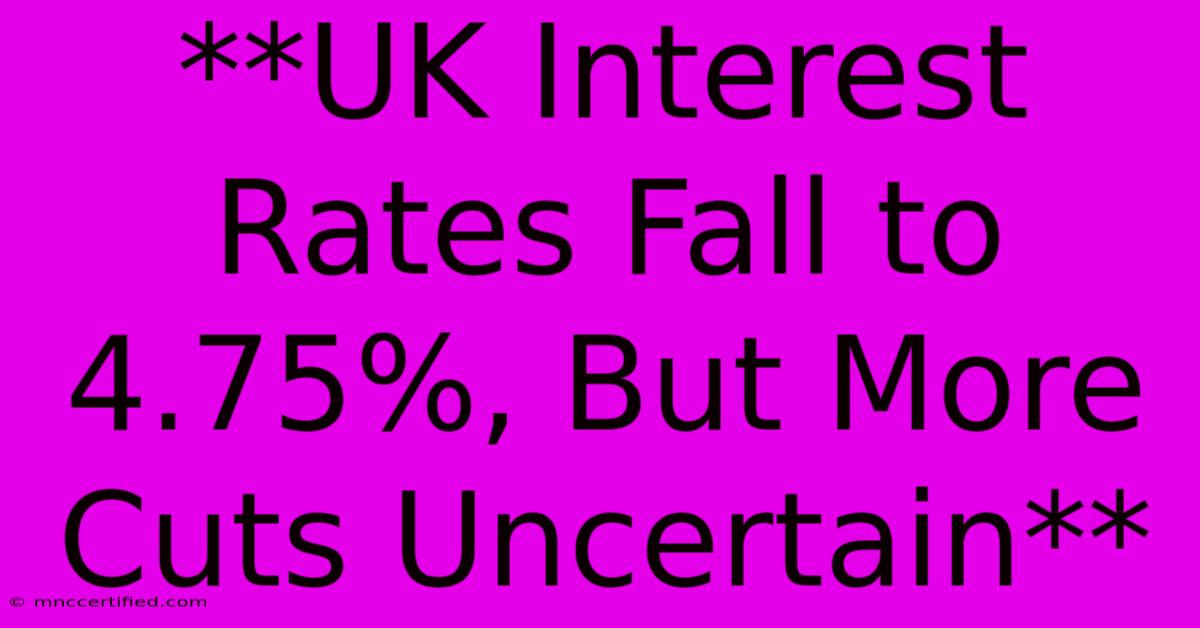**UK Interest Rates Fall To 4.75%, But More Cuts Uncertain**

Table of Contents
UK Interest Rates Fall to 4.75%, But More Cuts Uncertain
The Bank of England (BoE) has announced a reduction in the UK base interest rate to 4.75%, marking the first cut since August 2022. This decision comes amidst growing concerns about the UK economy, with inflation still stubbornly high and fears of a recession looming.
However, the decision to cut rates was not unanimous, with some members of the Monetary Policy Committee (MPC) advocating for a pause rather than a reduction. This suggests that the path for future interest rate changes remains uncertain, and the BoE will closely monitor economic data to guide its next steps.
Reasons Behind the Rate Cut
The BoE cited several reasons for the decision to reduce interest rates, including:
- Weakening Economic Outlook: The UK economy is facing significant headwinds, including a cost-of-living crisis, rising energy prices, and a slowdown in global growth. These factors have dampened consumer spending and business investment, contributing to a weakening economic outlook.
- Falling Inflation: Although inflation remains above the BoE's 2% target, there are signs that it is starting to moderate. The Consumer Prices Index (CPI) fell to 8.7% in April, down from 10.1% in March.
- Labor Market Weakness: While unemployment remains low, the labor market has shown some signs of weakening. Job vacancies have declined, and wage growth has slowed. This suggests that the pressure on the BoE to raise rates to combat inflation is easing.
Uncertain Future for Interest Rates
While the rate cut provides some respite for borrowers, the BoE has emphasized that further cuts are not guaranteed. The MPC's decision to cut rates was closely divided, indicating that the central bank is closely monitoring the economic landscape and will act accordingly.
Several factors could influence the BoE's future decisions, including:
- Inflation Trajectory: The future path of inflation will be a key factor in determining whether further rate cuts are warranted. If inflation proves to be more persistent than expected, the BoE may be reluctant to cut rates further.
- Economic Growth: The health of the UK economy will also be closely watched. If the economy weakens further, the BoE may feel compelled to cut rates to stimulate growth.
- Global Economic Conditions: The BoE will also be monitoring global economic developments, as these can have a significant impact on the UK economy.
Implications for Borrowers and Consumers
The rate cut is likely to provide some relief for borrowers, as mortgage payments and other borrowing costs will fall. However, the impact on consumers is likely to be mixed. While lower borrowing costs could boost consumer spending, the rate cut could also lead to further depreciation of the pound, which would make imported goods more expensive.
Conclusion
The BoE's decision to cut interest rates is a sign that the central bank is concerned about the UK's economic outlook. However, the future path of interest rates remains uncertain, and the BoE will closely monitor economic data to guide its next steps. The impact of the rate cut on borrowers and consumers will vary, but it is likely to provide some respite for those struggling with the cost of living crisis.
Keywords: UK interest rates, Bank of England, BoE, interest rate cut, MPC, inflation, recession, economic outlook, consumer spending, labor market, mortgage rates, borrowing costs, pound sterling.

Thank you for visiting our website wich cover about **UK Interest Rates Fall To 4.75%, But More Cuts Uncertain**. We hope the information provided has been useful to you. Feel free to contact us if you have any questions or need further assistance. See you next time and dont miss to bookmark.
Featured Posts
-
Europa League Live Manchester United Vs Paok
Nov 08, 2024
-
Europa League Manchester United Vs Paok Live
Nov 08, 2024
-
Bharti Axa General Insurance Two Wheeler
Nov 08, 2024
-
Property And Casualty Insurance Software
Nov 08, 2024
-
Homesteaders Life Insurance Phone Number
Nov 08, 2024